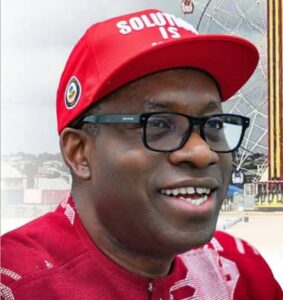
Governor Soludo’s engagement with various stakeholders reveals a carefully orchestrated strategy of participatory governance that transcends typical political machinations. His interactions with different groups demonstrate a nuanced understanding of how effective leadership requires constant dialogue with diverse constituencies, each bringing unique perspectives and expectations to the governance equation.
The governor’s engagement with Anglican bishops has been particularly multifaceted, ranging from collaborative to occasionally tense moments that illuminate the complex relationship between religious authority and political power. In January 2025, Soludo delivered a powerful call to action to over 170 bishops at the Church of Nigeria’s Anglican Communion, urging church leaders to reclaim their role as a moral compass in society. This engagement represented more than ceremonial interaction; it was an appeal for spiritual leadership to complement governance initiatives. The governor’s challenge to the bishops reflects his understanding that sustainable transformation requires moral authority working alongside political leadership.
However, the relationship has not been without friction. Soludo has challenged Anglican bishops to reduce fees in mission schools, begging church leaders to give every child equal opportunity during a prayer event at Dr. Alex Ekwueme Square, Awka. This request demonstrates how his commitment to inclusive education policy extends beyond government schools to encompass all educational institutions within the state. The governor’s willingness to make such requests publicly indicates his belief that true partnership requires uncomfortable conversations about accessibility and equity.
The complexity of this relationship became more apparent when religious leaders tackled Governor Soludo for going against preachers who use loudspeakers in public spaces, particularly markets. This tension reveals the delicate balance between religious freedom and public order that characterizes modern governance. Rather than avoiding difficult conversations, Soludo has consistently engaged with these challenges, understanding that authentic leadership requires navigating disagreements while maintaining productive relationships.
His approach to church-state relations extends beyond formal religious structures to encompass broader societal expectations. Soludo cautioned the church and society against mounting unnecessary pressure on public office holders, particularly in terms of financial commitments, arguing that the fight against corruption would be easier if the church and society lessen financial pressures on government officials. This frank discussion during the 13th Synod of Anglican Diocese of Awka demonstrates his commitment to addressing systemic issues that affect governance effectiveness.
The engagement with Ndi Anambra in the diaspora represents another dimension of his stakeholder approach, one that recognizes the global nature of modern governance. While his political opponents focus on traditional campaigning, Soludo’s choice to engage diaspora communities in Lagos, Abuja, UK/Europe, and now US/North America reveals a sophisticated understanding of how contemporary states must operate within global networks. These engagements are not merely reporting sessions but strategic investments in building long-term partnerships with citizens who possess expertise, resources, and perspectives that can accelerate state development.
The Maryland town hall meeting, scheduled as the 2025 election approaches, exemplifies this strategic thinking. Rather than using this opportunity for campaign rhetoric, Soludo is choosing to present his scorecard and engage in accountability discussions. This approach suggests confidence in his administration’s record while recognizing that diaspora communities expect substantive engagement rather than political theater. The diaspora possesses unique insights into global best practices and can serve as bridges between Anambra and international opportunities.
Furthermore, his engagement with diverse stakeholders, from traditional rulers to women’s groups, youth organizations, and professional associations, creates a comprehensive feedback mechanism that informs policy decisions. The first lady’s meeting with wives of Anglican Bishops to mobilize women for policy advocacy demonstrates how the administration leverages multiple channels to ensure inclusive participation in governance processes.
The significance of these varied engagements lies in their cumulative effect on democratic deepening and institutional strengthening. By maintaining dialogue with religious leaders, diaspora communities, traditional authorities, and civil society organizations, Soludo is creating a governance model that transcends the limitations of top-down administration. Each stakeholder group brings different expectations, resources, and accountability mechanisms that collectively strengthen the democratic process.
This pattern of engagement also reveals Soludo’s understanding that effective governance in a complex society requires building coalitions that extend beyond partisan politics. His willingness to engage with critics, challenge comfortable assumptions, and maintain dialogue even during disagreements demonstrates the maturity that distinguishes statesmanship from mere political survival. The upcoming diaspora engagement in Maryland, therefore, represents not just another town hall meeting but a continuation of a governance philosophy that sees citizen engagement as fundamental to democratic legitimacy and administrative effectiveness.
The broader significance of this approach extends beyond Anambra State to provide a model for how contemporary African leaders can navigate the complexities of global citizenship while maintaining local accountability. By engaging diaspora communities as stakeholders rather than distant observers, Soludo is pioneering an approach that recognizes how modern governance must operate across geographical boundaries while remaining rooted in local realities and democratic principles.



